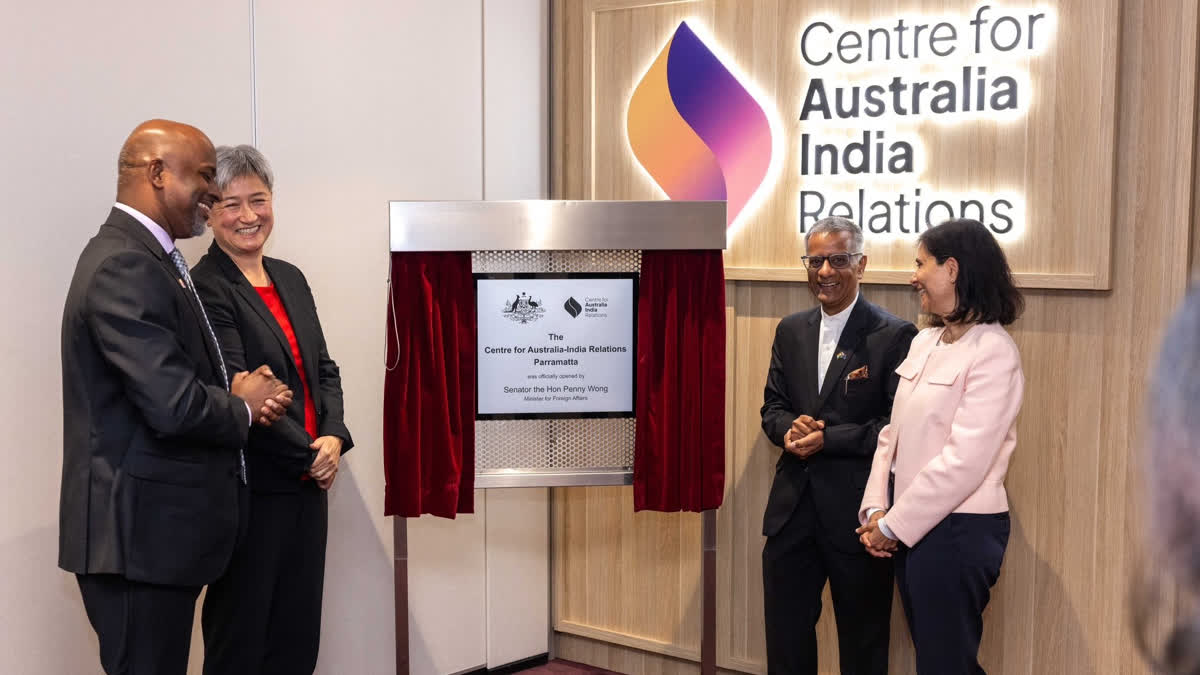New Delhi: With Australia setting up a new Centre for Australia-India Relations earlier this week, ties between the two countries are set for a new high given the growing importance being attached to the Indian diaspora in that country.
The headquarters of the Centre for Australia-India Relations are located at Parramatta, a satellite city of Sydney, Australia’s largest city and capital of the state of New South Wales. So, why is Australia setting up a separate centre for building ties with India despite having a high commission in New Delhi and consulates-general in Mumbai, Kolkata, Chennai and Bengaluru?
“The Australian government is deeply conscious of the large Indian diaspora in Australia, and feels that they should be given the opportunity to participate in our strengthening bilateral relationship with India,” Australian High Commissioner to India Philip Green told ETV Bharat. “Helmed by two very distinguished Australians of Indian origin, Centre for Australia India Relations (CAIR) will serve as a focal point for the bilateral relationship and particularly the role of the diaspora in it.”
According to a statement issued by the Australian Ministry of Trade and Tourism, CAIR will be a focal point for government, business, academia, the cultural sector and Indian-Australian communities to drive new partnership opportunities between the two countries.
“India is on track to be the world’s third-largest economy by the end of the decade,” the statement read. “To ensure Australia benefits from India's growth, the Australian Government will commence consultations on a future Australia-India economic roadmap. This roadmap will build on the landmark 2018 India Economic Strategy authored by Peter Varghese, and harness the untapped potential we see in some key sectors, while focusing and accelerating our work for the next phase of our relationship. Australia also continues to negotiate its next free trade agreement with India, including for greater market access in agriculture and manufacturing.”
Describing the Indian community as the fastest growing diaspora in her country, Australian Foreign Minister Penny Wong said that the new centre will help “better respond to a diverse and evolving India”.
The Indian community in Australia numbers around 9.76,000, according to figures provided by Indian High Commission in Canberra citing the census of 2021. After England, India is the second-largest migrant group in Australia. There is a constant flow of students and tourists from India. The growing significance of the community is reflected in the large-scale celebration of Indian festivals in Australia.
“The tapestry of Australia’s diverse communities is more intricate still.” Wong said. “Communities that speak English or Hindi, Tamil or Telugu, Punjabi or Gujarati. That celebrate Holi or Diwali, Eid or Vaisakhi, Christmas or Vesak.”
Wong further stated that the CAIR will play a special role in celebrating and harnessing the talents in the community. “That’s why we are announcing today the Centre’s CEO and Director Network, which engages Indian-Australian corporate leaders to build knowledge of India among their peers in the Australian business community,” she said.
During the course of her speech, Wong also announced the recipients of the CAIR’s inaugural Maitri fellowships.
What are the Maitri fellowships?
“The Maitri Fellowships programme will see Indian researchers and academics placed in Australian institutes, working with their Australian counterparts to deepen thinking on strategic and regional issues,” Wong said. “They include placements to consider how Australia and India can collaborate to strengthen our presence in Southeast Asia, or explore opportunities to strengthen maritime port infrastructure and connectivity between our countries.”
According to the Australian Foreign Minister, the inaugural Maitri Scholars programme will this year bring five of India’s brightest minds in STEM (science, technology, engineering and math) research to Australia to undertake postgraduate studies with practical applications.
“They include research on the storage and transportation of green hydrogen for sustainable energy solutions, and on improving our understanding of soil behaviour for the installation of offshore wind turbines,” Wong stated.
What are the primary objectives of the CAIR?
“The Centre’s mission is to promote enhanced cooperation and exchange between Australia and India and to transform our economic engagement, underpinned by deep and growing people-to-people ties,” High Commissioner Green explained to ETV Bharat.
It is worth mentioning here that in the federal budget announced earlier this month, the Australian government allocated A$14 million to expand the Australia India Business Exchange.
“We cannot talk about the future of the Australian economy without talking about India,” Australian Trade Minister Don Farrell was quoted as saying. “A new India economic roadmap will help us focus and accelerate our efforts to harness India's growth, and tap into the enormous trade and investment opportunities that will help us secure a future made in Australia,” Farrell said.
According to Tim Thomas, the CEO of the CAIR and a person of Indian origin, the new centre “is excited to establish its headquarters in Parramatta, a thriving innovation ecosystem and an important focal point for the vibrant Indian-Australian community”.
“The centre has built strong momentum through our Maitri grants and stakeholder impact programmes,” Thomas said in the statement issued by the Ministry of Trade and Tourism. “The centre will continue to galvanise Australian stakeholders to move on the tremendous opportunities that India's growth presents.”



